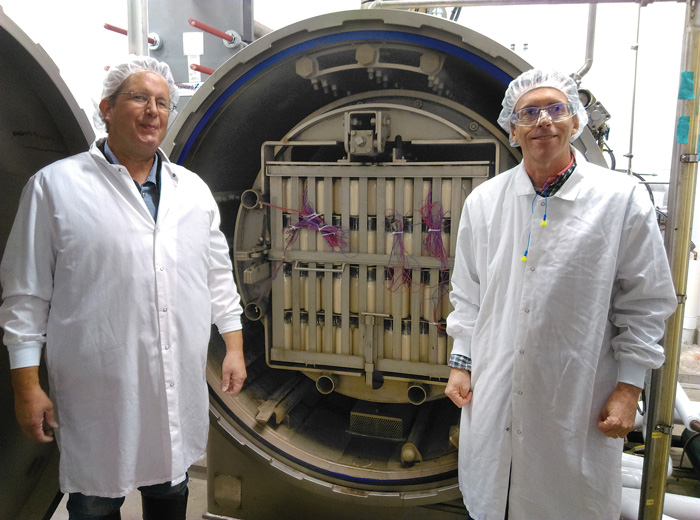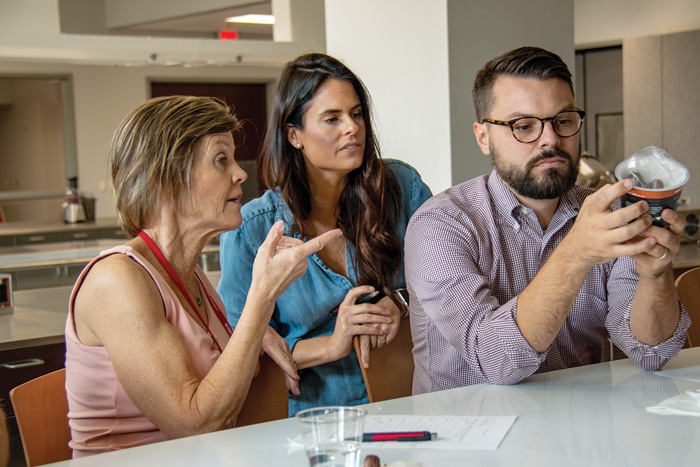
University Labs Support Industry Innovation
Universities are playing an essential role in the development of new foods and beverages that respond to changing consumer demands.
Article Content
University-based food scientists and food science departments have a long history of providing support and fresh ideas to the food industry through basic research and partnerships with major corporations. Now, universities are increasingly developing capabilities to support the efforts of small and mid-sized companies and entrepreneurs who are bringing new products to market.
“I think most people agree that innovation is happening with the startups and small to mid-sized level,” observes Louise Wicker, professor at Louisiana State University’s (LSU) Agricultural Center. “And food incubators, like the LSU AgCenter Incubator and other incubators at Rutgers, North Carolina State, and Oregon State University, are providing the expertise, the equipment, and the processes to help these companies start on their innovation journeys.”
William Aimutis, executive director of the North Carolina Food Innovation Lab (NCFIL), College of Agriculture and Life Sciences at North Carolina State University, sees consumer shifts in food preferences driving entrepreneurial approaches to new food products, with major food companies “willing to pay for those entrepreneurial ideas because it saves them literally millions of dollars as the new product is already developed, marketed, and successful.”
Eric Decker, professor and head of the Department of Food Science at the University of Massachusetts, Amherst, agrees, pointing to trends in healthy and plant-based products as “opening the door to entrepreneurs to explore their new product ideas.”
Allpax Products, a designer and manufacturer of production retorts for the commercial sterilization of low-acid shelf-stable foods, recently explored the role universities are playing in the changing landscape of the shelf-stable food market. While designing and manufacturing small, multifunctional retorts for food development laboratories and test kitchens, the company became aware that its smaller retorts, which had been purchased mostly by mid-sized to large food manufacturers and co-packers, were increasingly being sought after by universities, which required flexible methods of sterilization suitable for shelf-
stable foods.
Partnerships Breed Innovation
“One of the reasons that I am back in academia is because of the vibrant extension program and the food science pilot plant that serves all three missions of a land grant university: research, extension, and teaching,” says Dharmendra Mishra, assistant professor and extension food technologist in the Department of Food Science at Purdue University.
Misha, who worked at Nestlé and Mead Johnson Nutrition before returning to academia, partnered with Holic Foods, which used Purdue’s Food Science Pilot Plant to gather data for the development of a clean label jalapeno-based sauce. After developing the sauce, Holic built a $2.1 million plant to manufacture its own branded acidified and high-acid food products and now serves as a co-packer and private label packager for other companies. “Along with producing our naturally addictive products, we want to help Hoosiers realize their dreams of becoming food entrepreneurs,” says Shari Nicholls, vice president of strategy and marketing at Holic.
Pilot plant and incubation services are not the only ways that universities can help companies grow. Michigan State University (MSU) Extension, for example, recently launched the Food Processing and Innovation Center (FPIC), a U.S. Food and Drug Administration (FDA)-licensed food canning facility. Companies can rent the facility to produce product either for test marketing or in volumes suitable for a small to mid-sized business to market to customers.
“The FPIC is part of the wider MSU network of counselors and specialists throughout the state that help Michigan-based companies—agricultural, food, and bio-based companies—with their businesses,” says Tina Conklin, associate director, MSU Product Center, and director, FPIC. “MSU does nutrition fact research, process authority review, [and] business counseling—and the FPIC is the extension of this work. The idea is to take a stage-two company and mitigate their cost by giving them R&D and batch production space. We work all the regulatory angles before they arrive so that they walk out the door with salable product.”
Jason Hofman, facility and operations manager at the FPIC, adds, “It’s not unique necessarily to have an innovation center for food processing. What is unique is to produce salable product to the general public. We are licensed with the Michigan Department of Ag and Rural Development and with the FDA as a food processing establishment. We have a grant of inspection for meat and poultry products with the USDA (U.S. Department of Agriculture) for raw and ready-to-eat production.”
The NCFIL at North Carolina State works with companies at the start of their journey by providing services that help with ideation, product development, product scale-up, and launch assistance. NCFIL’s pilot plant operates under current good manufacturing practices and is capable of producing and packaging foods for evaluation.
“It became apparent that our team was trying to run two complex businesses, a working mushroom farm and a value-added processed foods business,” says Laura Stewart, CEO, Haw River Mushrooms, and a client of the NCFIL. “We were interested in NCFIL because of the fact that they have food scientists, business consultants, and production and co-packing ability all under one roof. Accessing cohesive resources about all those business facets has been invaluable for us in terms of pointing the way toward a more holistic approach to scaling of production, staffing, branding, product diversity, and food safety and security assurances.”
Lee Cooper, CEO, Barvecue Inc., a plant-based vegan barbecue company, had a similar experience. “We have completed our business plan, accomplished key product and process innovation for scale, and we have a clear direction for the next steps,” he says. “Working with NCFIL helped us achieve real results and has added strength to our company as we work on funding and begin executing our plan. The second phase of our project with NCFIL will utilize select assistance and support as we execute our growth plan.”
Brad Lepczyk, co-founder of plant-based beverage company Memore, points out that an additional advantage to working with a university is access to the world of academia. The research campus at NCFIL, for example, houses research teams from many major universities in North Carolina. “We are developing a cognitive health beverage, so we felt that greater access to experts in this field provided us with a level of legitimacy and credibility that we otherwise wouldn’t have had,” he notes.
Supporting Shelf-Stable Demand
Allpax’s investigations into university-based research and the need for multi-mode lab and small-batch retorts illuminates some of the reasons behind the growing demand for shelf-stable food. “Having access to foods, particularly now with the COVID-19, is a concern,” notes Wicker, who has worked with her team to develop shelf-stable shrimp, as well as a shelf-stable sweet potato demonstration product that is rich in vitamins A and C and fiber. “People ask themselves, ‘If I can’t get to the grocery store, how can I eat and continue to eat well?’ And so, shelf-stable foods fit into that category of health, convenience, and food security.”
“The refrigerated section is the competitive section in supermarkets,” says Conklin. “If you can make your product shelf stable, your chances of getting shelf space is better. The batch retort is essential for the companies coming to our facility.”
Mishra agrees. “Bringing low-acid, high-acid, and acidified foods to market is attractive to startups due to the fast time to market and lower production costs,” he notes. “Having a multi-mode retort is bringing clients to us and extends our capability in shelf-stable commercial food manufacturing.”
Needless to say, retorting is only one factor in the successful development of new foods. Properly equipped university innovation centers and pilot plants are essential, as is the dedication of university-based scientists committed to excellence in research, extension, and teaching—and their partnerships with forward-thinking entrepreneurs and industry players.
Chris Barbier is a technical sales consultant at Allpax, a ProMach brand, Covington, La. ([email protected]).







